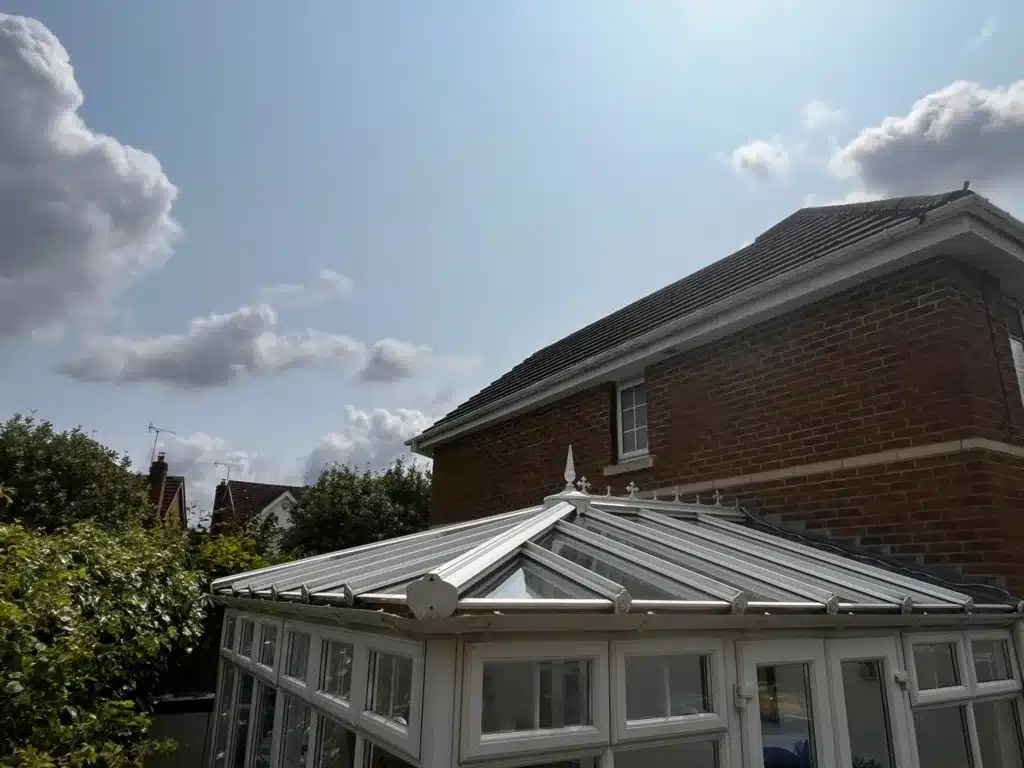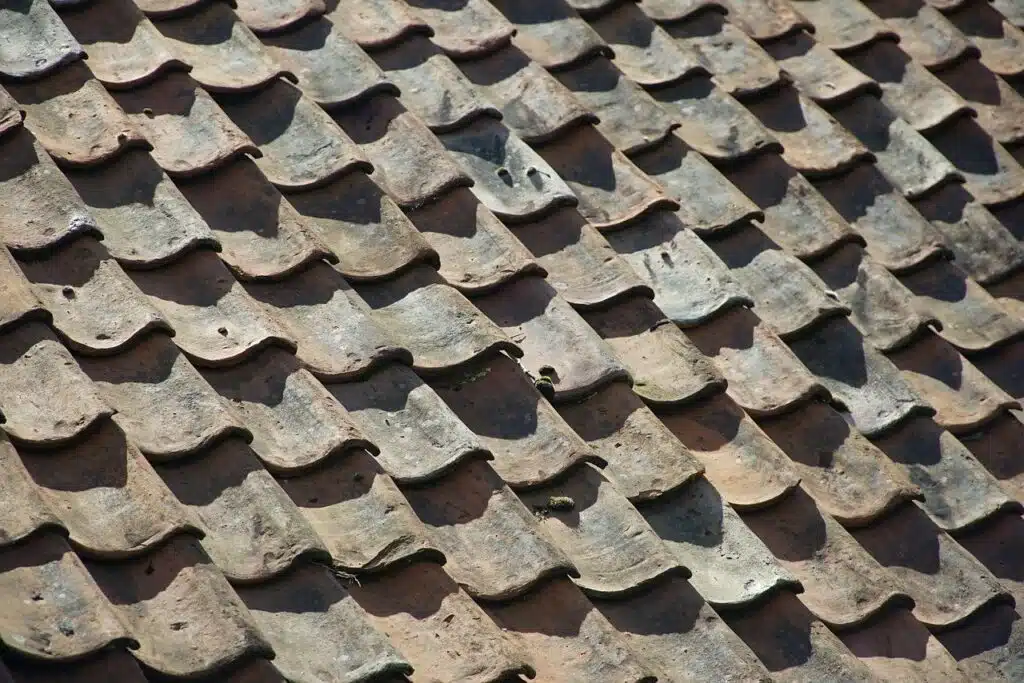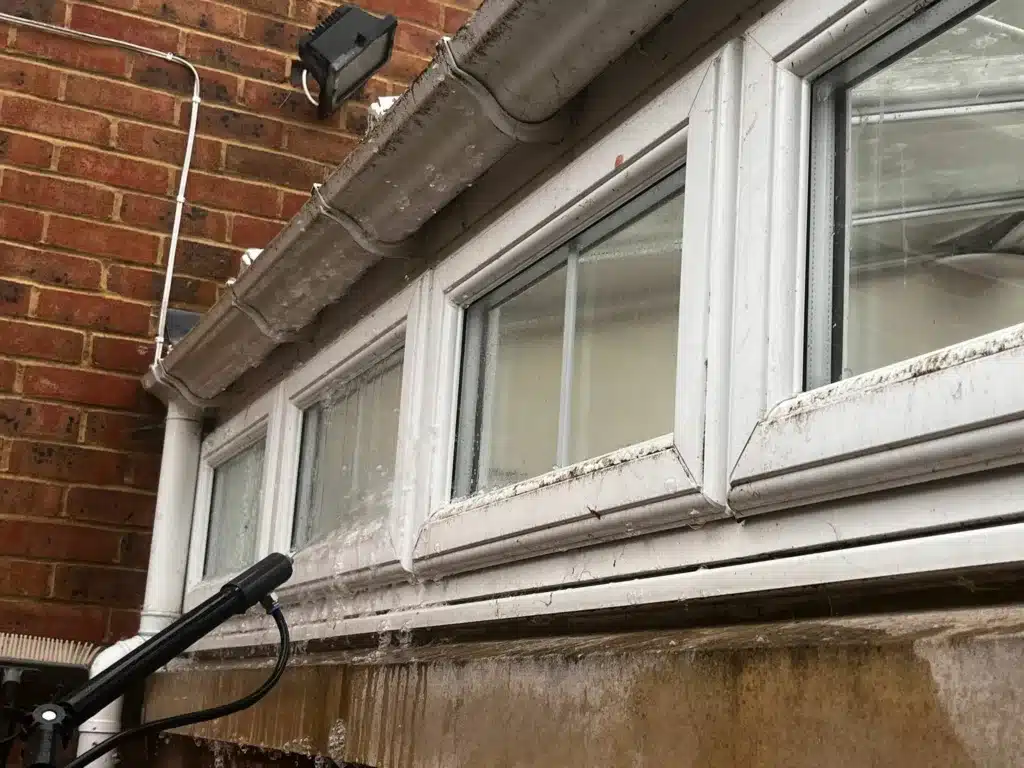You might be familiar with what power washing is, but what about soft washing? What is the difference between soft washing and power washing and why is it sometimes a better option?
To answer these questions and more, we have put together our comprehensive guide to soft washing. Here, we will explain exactly what soft washing is, how it is delivered and how you can reap the benefits it brings.
What is soft washing?
Soft washing is a cleaning method designed to remove dirt, debris, moss, algae, mould and bacteria from external surfaces. Developed during the 1980s, soft washing was found to be highly effective at removing the roof algae that was prevalent in the hot and humid climate of Florida.
Unlike power washing which can damage roof shingles, soft washing uses a high volume of water and a strong concentration of chemicals delivered at low pressure – protecting surfaces from structural damage or decolourisation.
The cleaning method quickly gained traction and it wasn’t long before it made its way over the Atlantic and became the go-to method for non-abrasive cleaning.
What’s the difference between soft washing and power washing?
The primary difference between soft washing and power washing is that soft washing uses low water pressure, making it more suitable for cleaning areas prone to damage, like roof tiles.
There are also further differences between the two popular cleaning methods. Soft washing uses a stronger concentration of chemicals – this is to make sure that bacteria, roots and other matter are fully killed off and removed despite the low water pressure. It is also considered more environmentally friendly as it uses less water than power washing alternatives.

What equipment do you need?
A soft wash system typically comprises a tank for holding the cleaning solution, pumps, hoses, a trigger for flow control and a nozzle to release the solution onto the surface. First, the area is prepared for cleaning, which can mean removing any obstacles, covering up any surfaces you do not want to get wet and protecting nearby plants.
The solution is directed by the pump and through the hose directly onto the area you want cleaned. It is left for a short period to kill any weeds down to the root before being rinsed off.
Various types of soft wash systems are available on the market, with new innovations developing all the time. Soft wash systems, like other cleaning systems, need to be well-maintained to maximise their lifespan – this includes regularly flushing out their hoses and storing them appropriately
What chemicals are used in soft washing?
Below is a breakdown of what chemicals make up a typical soft wash solution:
- Sodium hypochlorite – Also known as chlorine bleach, sodium hypochlorite is extremely common in various cleaning agents. It kills bacteria, mildew spores, algae, moss, other weeds and fungi and penetrates the surface to destroy the roots, preventing re-growth.
- Water – Used as a dilutant.
- Clever wash (Soft wash surfactant) – A surfactant acts by loosening, absorbing and transporting material away from a surface, making it easier to remove. A common household product which includes surfactants is washing up liquid. Surfactants make water more effective at washing away residue and help prevent run-off – keeping the cleaning agent on the surface for longer.

What are the benefits of soft washing?
There are several benefits of this washing technique, making it increasingly popular with homeowners and businesses alike.
- Protects surfaces – As discussed, the low-pressure cleaning technique protects delicate structural surfaces like roof tiles from damage, corrosion and colour fade.
- Longer-lasting results – Soft washing is highly effective at cleaning and generally delivers long-lasting results – this is due to the higher concentration of chemicals than power-washing alternatives, meaning weeds and fungus are destroyed at the root rather than just washed away.
- Eco-friendly – Aside from using less water than power washing, the agents used in soft washing are bio-degradable.
- Improves kerb appeal – Soft washing is a brilliant way to clean up your external space, enhancing the overall kerb appeal of your property.
- Cost-effective – Whilst soft washing generally comes at a higher price point, it is a cost-effective cleaning method over time as you do not need to clean areas as frequently.
- Health – By washing away moss, mould, fungi, etc., you are improving your property’s conditions, which has a positive effect on the health of anyone occupying the building.
When should you use soft washing?
Soft washing is incredibly versatile and suitable for a variety of surfaces. It is especially ideal for surfaces that are delicate and vulnerable to damage from high-pressure washing. Examples of what soft washing can be used for include:
- Roofs (including asphalt shingles, clay tiles, metal roofing, slate)
- Patios
- Driveways
- Fencing
- Decking
- Outdoor furniture
- Sliding
- Gutters and downpipes
- Exterior walls
- Windows and glass
- Playgrounds and recreational spaces
- Swimming pool areas
- Awnings
- Signage
Final thoughts
We hope our article has given you an insight into the many advantages and uses of the soft washing cleaning method. This low-pressure, versatile cleaning process is rising in popularity but is best performed by cleaning professionals with access to all the correct equipment to perform the task to the highest standards.
Remember, the team at Scott & Sons are specialists in soft washing and offer the service to commercial customers throughout St Albans, Hemel Hempstead, Watford and surrounding areas.
Whether you want to give your roof a one-off clean or arrange a regular appointment, get in touch with our friendly team today to find out more.








